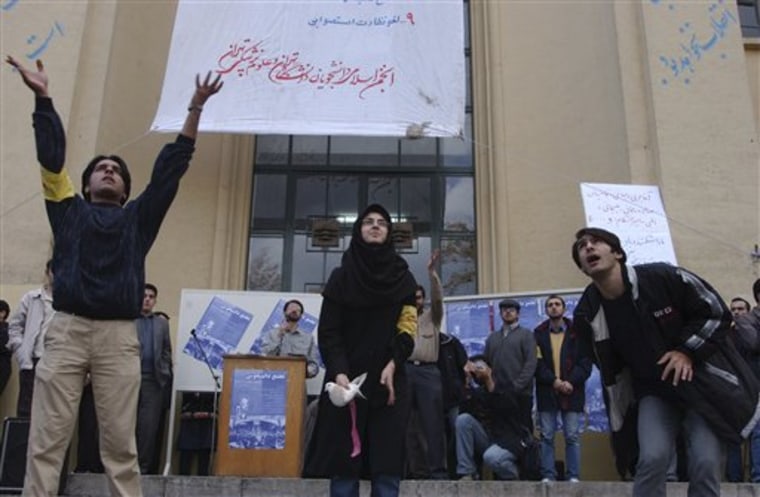Iran's political power struggles have brought no shortage of cutthroat intrigue with careers ruined, government officials arrested and even accusations of black magic. And now this — firebrand President Mahmoud Ahmadinejad as the voice of liberal dissent.
That's the latest twist in the showdown between Ahmadinejad and Iran's ruling clerics. Ahmadinejad — reviled by the opposition as a figurehead of hard-line rule — is now temporarily in the reformists' corner by opposing plans to segregate male and female students at Iranian universities.
"It is necessary to swiftly prevent these backward, shallow-minded actions," Ahmadinejad wrote in an order earlier this week addressed to members of his Cabinet.
It also nudged the political dramas further into territory that's surprising even by Iran's roughneck standards, where potshots and bitter quarrels are common fare in parliament and elsewhere. This time, the battle is Ahmadinejad versus the theocracy that once backed him.
For months, the ruling Islamic system has increasingly chipped away at Ahmadinejad's power base. His perceived offense: Trying to expand the powers of the presidency to set policies and pick key government posts.
Dozens of the president's allies have been detained since April, including four senior government officials last month. Some critics also accuse Ahmadinejad's chief aide, Esfandiar Rahim Mashaei, of leading a "deviant current" that seeks to undermine Islamic rule and even conjuring up magic spells to cloud the president's mind.
Last week, Ahmadinejad lashed back, calling the arrests a "politically motivated" attack on his government.
But there is little he can do except rage. The battles have shown clearly that Iran's clerical rulers, headed by Supreme Leader Ayatollah Ali Khamenei, have no intention of giving up any controls and will dictate the direction of the next presidential election in mid-2013 — which Ahmadinejad cannot join because of term limits.
Ahmadinejad's expected choice as successor — his ally Mashaei — appears to be blackballed from even getting on the ballot.
Although it appears the ruling system is happy to weaken Ahmadinejad, it doesn't want to press too far and bring an all-out political rupture. Lawmakers opposed to Ahmadinejad wanted to bring him for questioning last month, but abandoned the effort after worries it could show too much internal discord to the world.
"If there was any question about whether Khamenei and the ruling clerics still held absolute power, they have answered it loud and clear," said Sami Alfaraj, director of the Kuwait Center for Strategic Studies.
The campus ruckus is a test for one of the major initiatives by the ruling clerics after the large street protests over Ahmadinejad's disputed re-election in 2009 — trying to weed out suspected "un-Islamic" elements from universities, which were considered hotbeds of dissent.
Islamic authorities have been tightening their grip on universities and schools as hard-liners expand an ideological "soft war" against Western influence.
In recent years, Iran has imposed restrictions on 12 university programs, mainly humanities and social sciences, deemed too Western and incompatible with Islamic teachings.
Liberal and secular professors teach at universities around the country, but they are a minority. Most are politically passive and do not identify with either the hard-liners or the liberal camp.
In his latest order, Ahmadinejad has also instructed his Cabinet not to let university professors be pushed into retirement any more. But his opposition to gender segregation could bring the most upheaval when classes resume in September.
Although Iran follows Islamic rules such as banning alcohol and requiring headscarves, there is very little separation of sexes such as in Saudi Arabia or the Gaza Strip. Men and women in Iran work side-by-side in offices, couples pack cafes in trendy areas of Tehran and women serve in parliament. In November, the powerful Basij volunteer force announced its first woman pilot.
A campus divide would mark one of the most significant gender-based restrictions since the 1979 Islamic Revolution.
But hard-liners insist Ahmadinejad cannot stand in the way of the ruling clerics.
Grand Ayatollah Nasser Makarem Shirazi, one of the leading conservative scholars in Iran's seminary city of Qom, said he "deplored" Ahmadinejad's opposition and called it harmful to Islam.
Ayatollah Reza Ostadi, Qom's Friday prayer leader, suggested that Ahmadinejad is contributing to "corruption" by trying to block the gender separation on campuses.
"After studies were carried out, it was decided to segregate male and female students at universities to reduce corruption, but the president has opposed it," Ostadi said. "This is not fair."
And another gender war could be brewing.
Reports suggest Ahmadinejad has renewed his push for women to attend soccer games at stadiums.
In 2006, Ahmadinejad surprised his conservative backers by deciding that women could attend the matches, saying a female presence would "improve soccer-watching manners and promote a healthy atmosphere." Ahmadinejad was overruled by Khamenei.
Some top clerics have also denounced sending Iranian women athletes to international competitions, calling it a "disgrace."
___
Murphy reported from Cairo.
